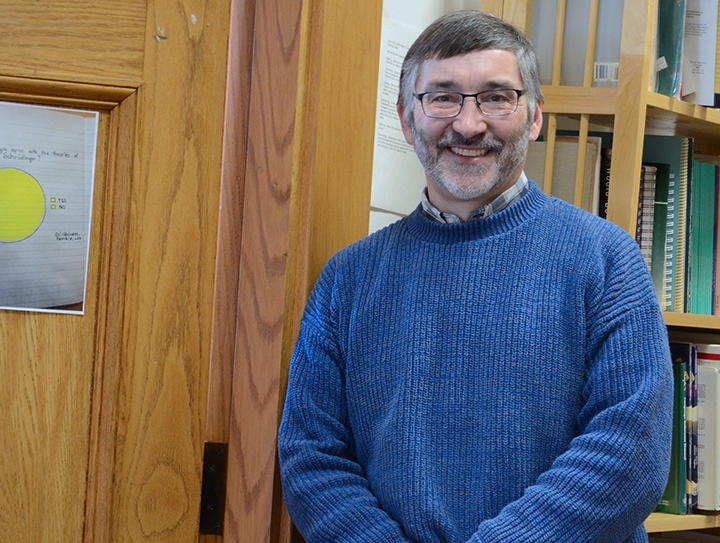William Peterson, Mathematics Professor, Wins Perkins Award

MIDDLEBURY, Vt. – Middlebury College has awarded the 2014 Perkins Award for Excellence in Teaching to William P. Peterson, professor of mathematics and the college’s expert in the field of probability and stochastic processes.
Members of the college community are invited to a reception honoring Professor Peterson on Thursday, April 3, at 4:30 p.m. in Room 104 of McCardell Bicentennial Hall. Nominated by his students and colleagues alike, Peterson is admired for deepening others’ appreciation for mathematics and what it can do for them in their lives.
“Professor Peterson makes me want to be a better student, and even more so a better person,” one undergraduate said. “He is a great professor and role model,” another student wrote, “but more than that he epitomizes the patience and kindness for which I strive as a human being.”
“He cares about his students – how well they understand the material, how their lives are going outside of math class, and who they are as people,” a third student noted.
Peterson’s advisor at Dartmouth College used to tell his students, “If it’s not fun we are going to stop doing it.” Peterson, who graduated as salutatorian of his class at Dartmouth, has carried that philosophy into his own teaching at Middlebury, largely because his area of interest, probability, is applicable to everyday life.
“The field of probability is very colorful. Its origins have a lot to do with gambling, which everyone finds easy to relate to, but probability really addresses how to behave rationally in the face of uncertainty. It’s about: Where should I invest my money? Do I need an insurance policy? Should I carry an umbrella today?
“In mathematics people often ask, ‘What will I use that for?’ But no one ever asks you about the value of studying probability because there are applications for it everywhere you go,” Peterson explains.
Peterson joined the Middlebury faculty in September 1989, four years after earning his Ph.D. in operations research at Stanford University. He used the time to put his theories into practice – “the lab course I never took in grad school,” he calls it – as the operations management scientist for a Cambridge, Mass., software firm that was building systems for manufacturing clients. As the in-house mathematician, Peterson “proved limit theorems for random processes” while his colleagues used the math to write the code for software programs to make manufacturing more efficient.
At Middlebury Peterson teaches courses in probability, statistics, stochastic (or random) processes, and operations research, in addition to calculus and linear algebra. He also offers from time-to-time a first-year seminar titled “Chance,” which examines timely topics from the combined perspective of probability and statistics. His most recent “Chance” seminar evaluated the risks of texting while driving, the spurious data used to suggest a link between vaccines and autism, and the questionable methodology of the college rankings in U.S. News and World Report.
Outside the classroom Peterson has delivered scores of presentations at schools and conferences on topics such as “The Monty Hall Problem,” “How Many Iraqi Civilian Casualties?” and “Probability, Queues, and The Real World.” He has written numerous book chapters and refereed articles, and in 2011 he published the book “Probability Tales” (American Mathematical Society) along with co-authors Charles Grinstead of Swarthmore College and J. Laurie Snell, who was Peterson’s esteemed advisor at Dartmouth College. The book explores four real-world topics – streaks, the stock market, lotteries, and fingerprints – through the lens of probability theory, and is used widely to supplement standard college texts.
Profs. Peterson and Snell also developed a project in the early 1990s (originally funded by the National Science Foundation) in which they created course materials to teach probability and statistics to liberal arts college students who are not math majors. The project, which went online before modern Internet browsers such as Netscape were available, has evolved for more than 20 years and today is called ChanceWiki.
Middlebury College would be pressed to find a more ardent proponent for mathematics education than “Bill” Peterson, who said, “Math is really one of the most flexible of all the undergraduate majors. We have grads doing pure math, statistics, computer science, and operations research, but we also have grads in teaching, banking, finance, medicine, and the sciences. In almost any quantitative field, employers are happy to have someone with mathematical training.”
The Perkins Award is provided by the Professor Llewellyn R. Perkins and Dr. Ruth M.H. Perkins Memorial Research Fund, and it was made possible by a gift from Ruth Perkins, Middlebury Class of 1932, in memory of her husband, Llewellyn, who taught at Middlebury from 1914 through 1941. Professor Perkins founded and chaired the mathematics department.
Their children, Marion Perkins Harris ’57, a science teacher, and David Perkins, a physician, augmented the fund and expanded the scope of the award to honor their mother, Ruth, as well as their father. The award supports the recipient’s faculty development. It is presented in even-numbered years to a member of the mathematics or computer science department, and in odd-numbered years to a faculty member who teaches in the natural sciences.
The award was created in 1993 and this year’s recipient, William Peterson, was also the first recipient of the honor.
Written by Robert Keren

